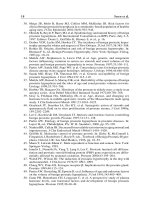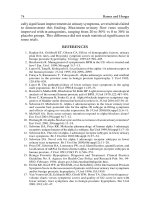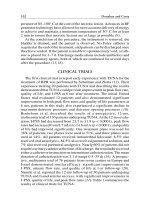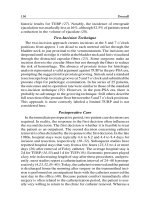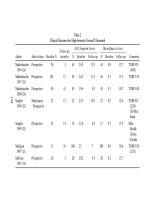23 hypertrophy training fatigue management
Bạn đang xem bản rút gọn của tài liệu. Xem và tải ngay bản đầy đủ của tài liệu tại đây (495.94 KB, 19 trang )
UNIVERSITY
Hypertrophy
Training
Fatigue Management
The Lesson
Fatigue management Overview
Fatigue Training Variables
Assessing fatigue
Volume Block Planning
Deloading
Introduction Weeks
Autoregulating Volume, Load, rep targets, exercise
Active Rests
Missed Training and Training while Traveling
Contest Prep Training
Fatigue Management
Training Stimulus produces positive adaptations but comes along with
a production of fatigue
Beginner: Training = High Stimulus and Low Fatigue
Advanced: Increased Training= Moderate Stimulus and High Fatigue
More advanced you get more stimulus is needed, but fatigue will
accumulate faster
Fatigue will limit performance and stall results, so it must be managed
to continue progressing
We must have short and long term management strategies
Managing fatigue we can decrease injury risk, allow greater
performance improvements and mental recuperation
Fatigue Management
Long term
Volume Blocks Periodized
Deloads
Active Rests
Short term
Auto regulated Low Volume Sessions
Autoregulated load/reps, exercise choice
Autoregulated deloads
Utilizing all these strategies we can make an individualized plan and
build competency in self awareness and autonomy is training
decisions.
Signs of High Fatigue
Rate of Perceived Exertion/Stress
Gym Performance
Strength
Decreased Muscle Pump
Heart Rate Variability
Training Motivation
Mood Changes
Appetite Suppression
GI disruption
Sleep Disruption
Illness
Injuries and Stiffness
Loss of Libido and Menses
Assessing Fatigue
•
•
•
•
•
•
•
•
Perceived Recovery Scale 1-10
Sleep Quality 1-10
Log Book: Strength Decrease, Increase, Maintain?
Life Stress 1-10
Aches and Pains Increase Y or N?
Are you Motivated to train? Y or N
Rate Hunger 1-10?
Grip Strength
Volume Block Periodization
Training blocks (mesocycles) should vary volume block to block based
on recovery capacity
Offseason might have several 6-8 week blocks that get progressively
harder or specialized for certain muscle groups each mesocycle
We might have blocks with mini cuts, low PED levels, Pre contest
phases were recovery is decreased.
Lower volume should be reactive in these situations rather than
assumptive, but each block should take the previous block into
consideration.
Deloads and Intro weeks help bridge the gap between these blocks
*Periodization lay out will be covered next lecture
Deload Explained
7-14 day period of reduced training stress to drop fatigue, heal
injuries, and prepare for next training block.
Beginners/Early intermediates autoregulated/reactive deloads, access
every 6-8 week block, implement regardless after 2-3 training blocks
Intermediates/Advanced flexible preplanned, every 4-8 weeks block,
planned but autoregulated as well if need sooner.
By end of deload you should feel fresh to train, mentally focused, and
driven
Caution! One week of reducing fatigue can allow expression of high
amounts of strength while connective tissue may still be damaged
Autoregulating the Deload
1. Motivation to train and work decreased?
2. Sleep quality decreased?
3. Is there a decrease in load/reps?
4. Are injuries or pain occurring?
Yes to 0-1 questions: start next mesocycle
Yes to 2+ questions deload
*Yes to only injuries and pain take a week of high rep training, assess
troublesome movements
*adopted from Eric Helm’s Muscle and Strength Pyramid Book
How to Deload
How to Deload
7 day span
Reduce the number of work sets in ½
Use same Loads but 3-4 RIR
If joint stress is high, Stay in a higher rep range at 3-4 RIR
Introduce new exercises for the next training block
One extra rest day at beginning of deload can be added
Example:
Push Day Normal day
Bench press 300lb x 10 250lbs x 10 RIR 0-1
Push Day Deload
Bench press 300lbsx7 RIR 3
Active Rest
When:
Successive hard training blocks and need full on rest
Post contest
Post offseason
Vacation
How to:
No formal training scheduled, train per your enjoyment
Focus on recovery
No direct resistance training required
Duration:
7-10 days
Inadvertently this will happen 1-2x per year due to travel or family
matters, etc.
Do you have to take a week off from the gym? NO but this won’t hurt you
either
Low Volume Session
A full deload is not needed but an acute moment to drop fatigue for
that day
When:
Poor nights sleep
food and hydration off
High mental fatigue from stress or work
PRS Score < 4
How to:
Cut set volume in 1/2
Keep loading and RIR same, or drop RIR if fatigue is really high that day
If needing more than 1 every couple weeks, decide if overall training
volume is too high
Extra Rest Day
When:
Previous day training was poor
Walking with high fatigue/poor sleep
All signs of poor session ahead
No drive to perform a low volume/light session
What to do:
Take the day off!
Resume your split after the off day
An extra off day can be autoregulated strategy to extend training
blocks and avoid deloading too soon.
Autoregulating Load/Reps
What is it:
Training in higher rep range targets for the day due to joints/tissues feeling beat up
When:
Joint pain
Full deload is not needed yet
PRS > 8
How:
Move target rep range up 5 reps
Keep same session volume and RIR target
Normal day:
Bench press Set 1 5-10 reps Set 2 15-20 reps
Light session:
Bench press Set 1 10-15 reps Set 2 15-20 reps
Very Light session
Bench press Set 1 15-20 reps Set 2 15-20 reps
Autoregulating Exercises
What is it
Exercise rotation due to lack of recovery or high fatigue or lack of
progress
When to use it:
Certain exercises causing excessive fatigue
One day less recovered in certain target muscle
One lift not progressing over several weeks
Example:
Lower back sore and fatigued from deadlifts on back day.
On leg day you sub out back squats for belt squats to reduce lumbar
loading.
Trouble Shoot: Missed Training Sessions
If you miss a session push your split back a day and pick it back up
Or pick you split up where you left off
To ”catch up” and put extra sessions back to back can rapidly drive up
fatigue and effect later workouts.
Other option is do a low volume session as a “catch up”
Example:
Split: Push, Pull, Legs, off day, repeat
Missed session option 1: Push, pull, miss, legs, off, repeat
Missed session option 2: Push, pull, miss, low volume legs, repeat
Missed session option 3: Push, pull, miss, off, legs, off, repeat
Trouble Shoot: Traveling and Training
Traveling issues:
Fatigue from flights (food, hydration, jet lag)
New gyms and equipment
Sleep alterations
Schedule issues
This all can lead to less recovery ability and subpar training
What to do:
Plan ahead
Schedule hard training on non travel days
Look up gyms, equipment and times open
Pack food and some extra for just in case moments
Same lifts execute without change, new lifts approach with cation
Troubleshoot: Contest Prep Fatigue
Contest prep is an inevitable rise in fatigue and decreased recovery
ability
Autoregulate load/reps/volume just like in any other phase
This is no excuse to wuss out when times get tough
You will be fighting to uphold load and reps at some point on prep
Primary strategy: Low set volume as you need to maintenance levels
Secondary strategy: Split training session volume into more frequent
sessions
Additional Strategy: Switch exercises to less fatiguing movements that
require less stability.
Summary
Fatigue management is necessary to continued progression
Long term we base training volume on recovery capacity in that phase
(offseason, prep, blast, cruise)
Deloads can be reactive or preplanned when fatigue is too high and
we need a full week of recovery
Short term strategies within the training block such as extra rest days,
low volume session, load/rep manipulation, exercise choices all can be
used to keep training progressive.




